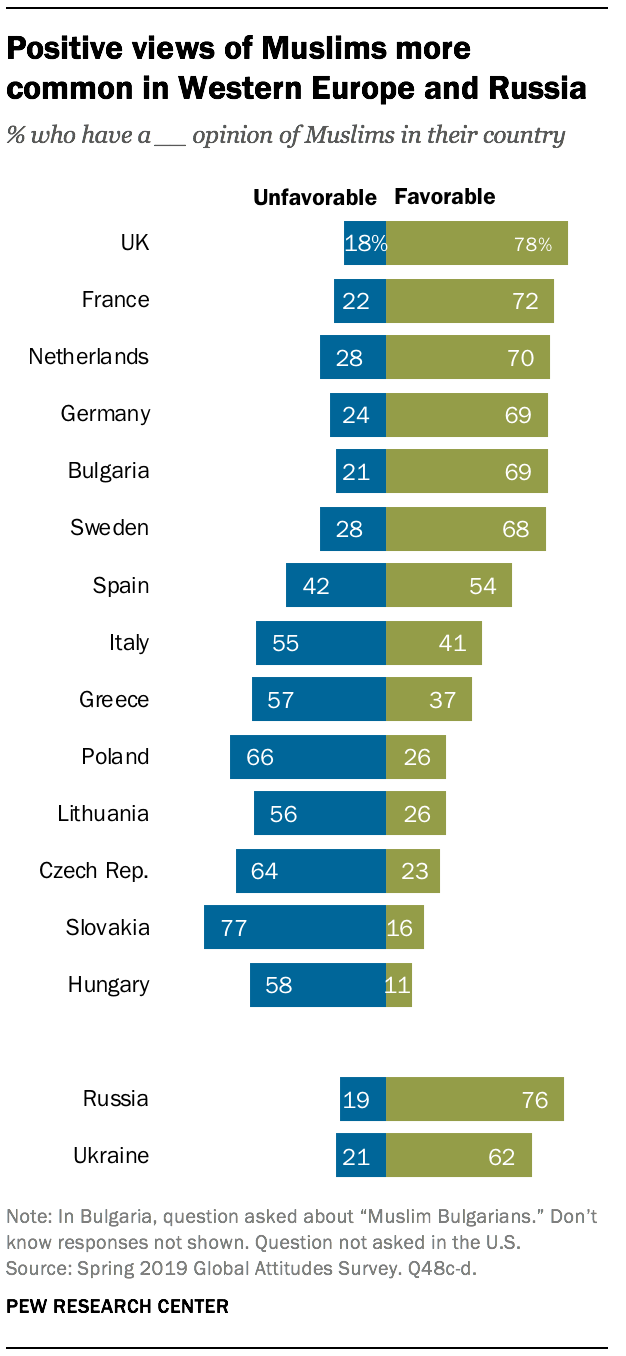 There is a wide divergence across Europe in attitudes toward Muslims. Generally, more favorable views of Muslims exist in Western Europe, Russia and Ukraine while more negative attitudes persist in Southern, Central and Eastern Europe.
There is a wide divergence across Europe in attitudes toward Muslims. Generally, more favorable views of Muslims exist in Western Europe, Russia and Ukraine while more negative attitudes persist in Southern, Central and Eastern Europe.
Solid majorities of people in the United Kingdom, France, the Netherlands, Germany and Sweden have positive opinions of Muslims in their country. And attitudes toward Bulgarian Muslims, who constitute around 12% to 14% of the country’s population, are also favorable. (In Bulgaria, the question specifically asked about “Bulgarian Muslims.”)
However, majorities in Slovakia, Poland, the Czech Republic, Hungary, Lithuania, Greece and Italy have unfavorable views of Muslims.
Meanwhile, views in Russia and Ukraine are mostly positive, and similar to attitudes in Western and Northern Europe.
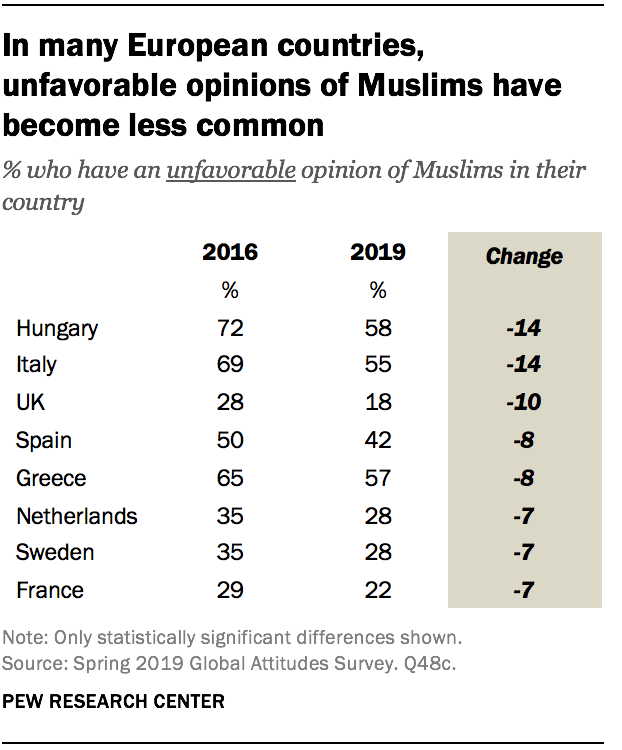 Despite these negative views of Muslims in Eastern and Southern Europe, unfavorable opinions have actually decreased in a number of nations since the question was asked in 2016, when millions of refugees from the Middle East and North Africa poured onto the continent. For example, in Hungary, where the current government has issued strict immigration controls, unfavorable views of Muslims have actually declined 14 percentage points since 2016. The same is true in Italy, where the anti-immigrant Lega party was part of a governing coalition during the period when this survey was fielded.
Despite these negative views of Muslims in Eastern and Southern Europe, unfavorable opinions have actually decreased in a number of nations since the question was asked in 2016, when millions of refugees from the Middle East and North Africa poured onto the continent. For example, in Hungary, where the current government has issued strict immigration controls, unfavorable views of Muslims have actually declined 14 percentage points since 2016. The same is true in Italy, where the anti-immigrant Lega party was part of a governing coalition during the period when this survey was fielded.
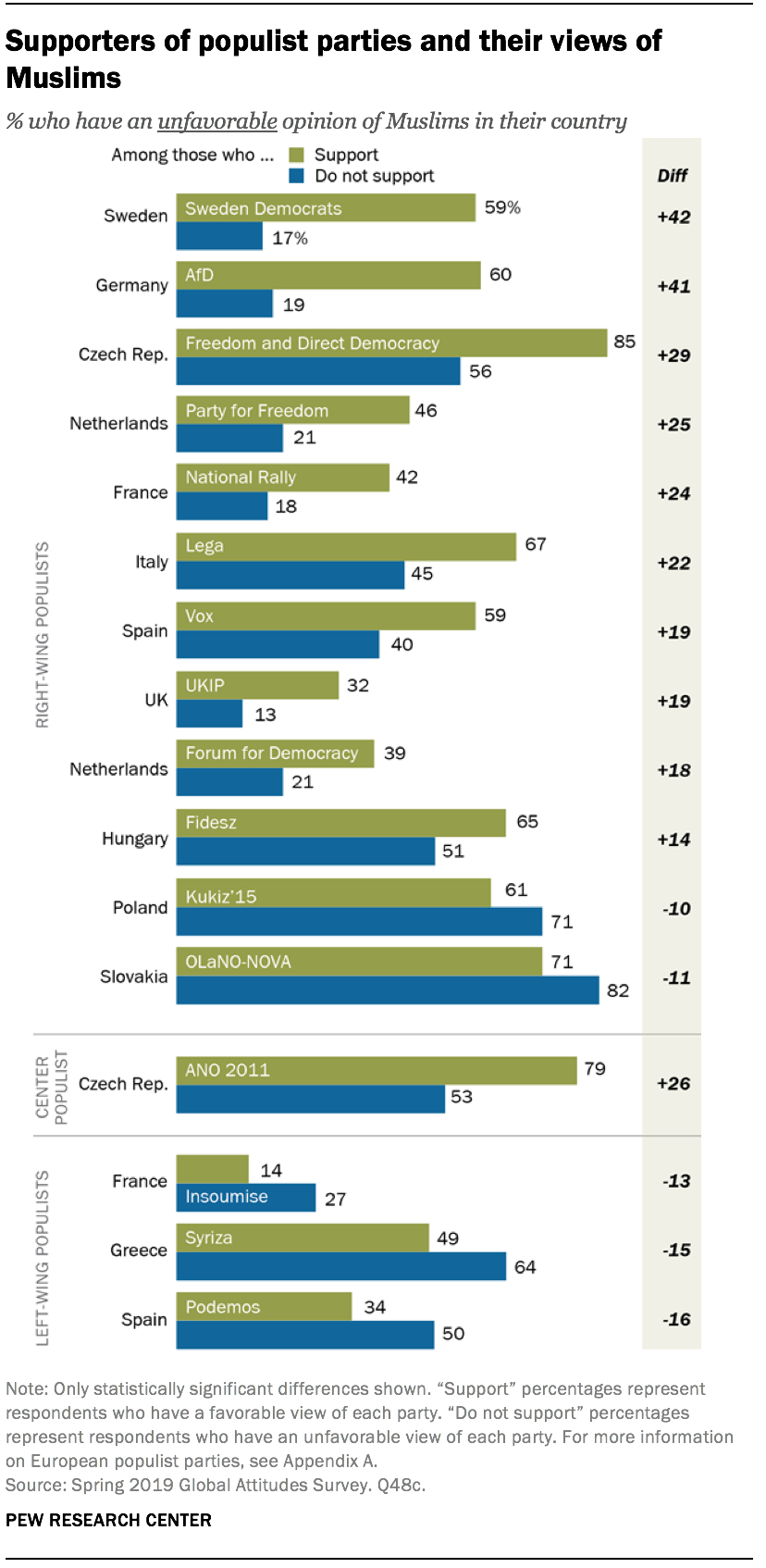 Despite the decline in negative sentiments toward Muslims, there are still sharp divides across the continent on favorability of the religious minority depending on support for populist parties.
Despite the decline in negative sentiments toward Muslims, there are still sharp divides across the continent on favorability of the religious minority depending on support for populist parties.
In Sweden, for example, those with a favorable view of the Sweden Democrats, a party that opposed increased multiculturalism and especially immigration, are 42 percentage points more likely to have an unfavorable opinion of Muslims than those with a negative view of the Sweden Democrats. And supporters of AfD in Germany are 41 points more likely to have an unfavorable view of Muslims than nonsupporters. Similar divisions apply to supporters and nonsupporters of the Freedom and Direct Democracy party (SPD) in the Czech Republic, PVV and FvD in the Netherlands, National Rally in France, Lega in Italy, Vox in Spain, UKIP in the UK and the ruling Fidesz in Hungary.
On the other hand, those who support more left-leaning populist parties in France (Insoumise), Greece (Syriza) and Spain (Podemos) are more favorable toward Muslims. The only centrist populist party tested whose supporters show less positive attitudes toward Muslims than its detractors is ANO 2011 in the Czech Republic.
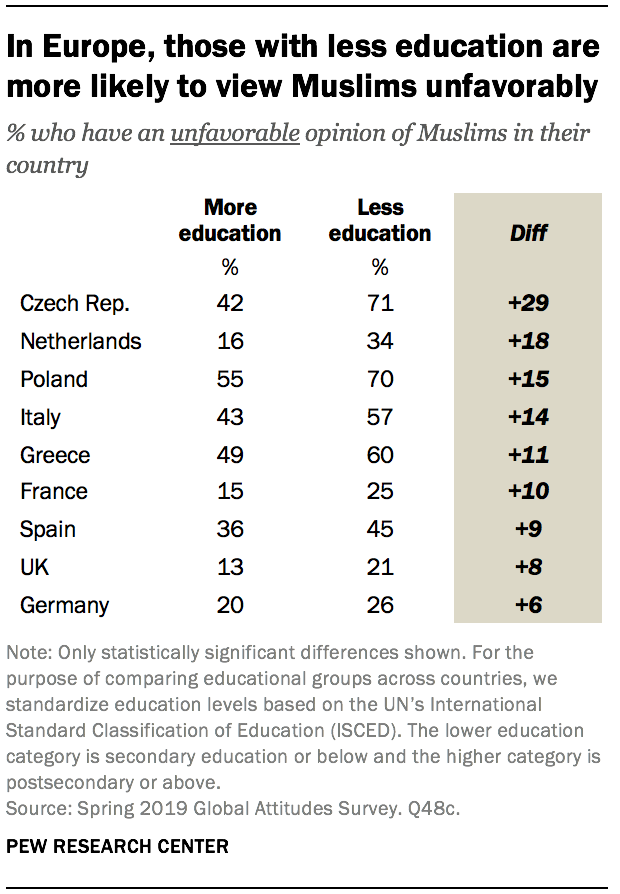 In addition, those who have less education in many of the countries surveyed are more likely to have unfavorable views of Muslims. In the Czech Republic, 71% who have a secondary education or less have a negative opinion of Muslims, compared with 42% among those with more education. These educational divides exist in nine of the countries surveyed.
In addition, those who have less education in many of the countries surveyed are more likely to have unfavorable views of Muslims. In the Czech Republic, 71% who have a secondary education or less have a negative opinion of Muslims, compared with 42% among those with more education. These educational divides exist in nine of the countries surveyed.
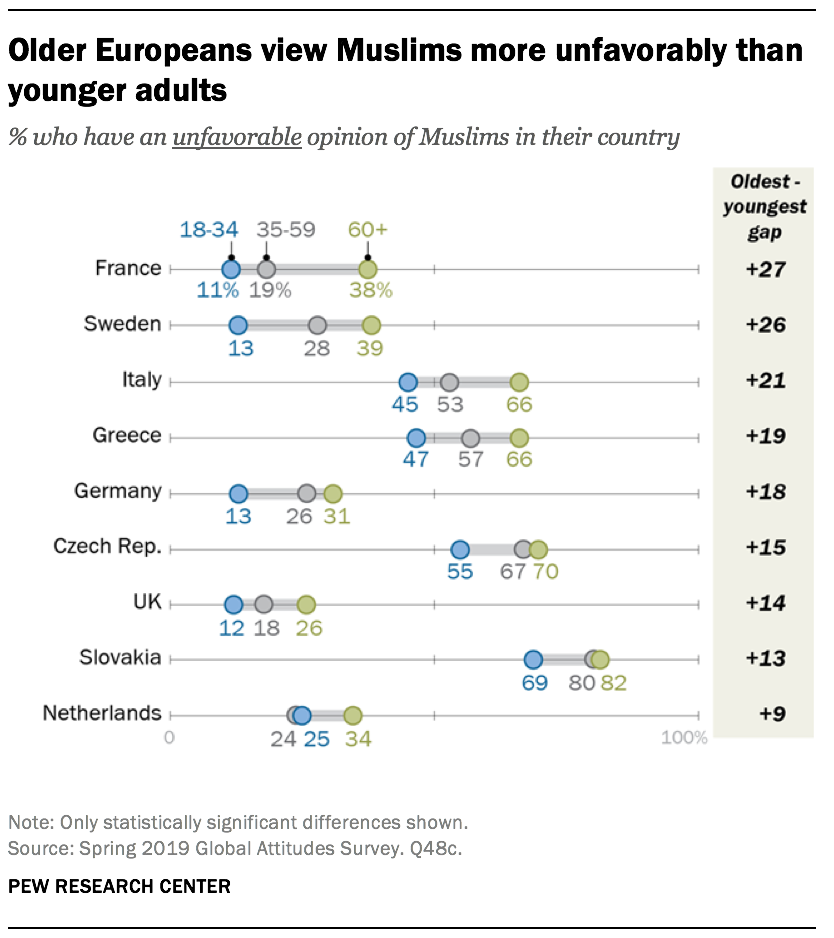 In Western Europe especially, negative attitudes toward Muslims are much more common among older people. In Sweden and France, people ages 60 and older are over 25 percentage points more likely to have an unfavorable opinion of Muslims than those ages 18 to 34. This pattern is also evident in Italy, Greece, Germany, the Czech Republic, Slovakia, the UK and the Netherlands. But there are few differences by age in most of the surveyed countries that lie in the eastern half of the continent.
In Western Europe especially, negative attitudes toward Muslims are much more common among older people. In Sweden and France, people ages 60 and older are over 25 percentage points more likely to have an unfavorable opinion of Muslims than those ages 18 to 34. This pattern is also evident in Italy, Greece, Germany, the Czech Republic, Slovakia, the UK and the Netherlands. But there are few differences by age in most of the surveyed countries that lie in the eastern half of the continent.
Favorable views of Jews prevail across Europe
Across the European countries surveyed, half or more express favorable views of Jews in their country. This includes roughly nine-in-ten or more in the Western European nations of the Netherlands (92%), Sweden (92%), the UK (90%) and France (89%).
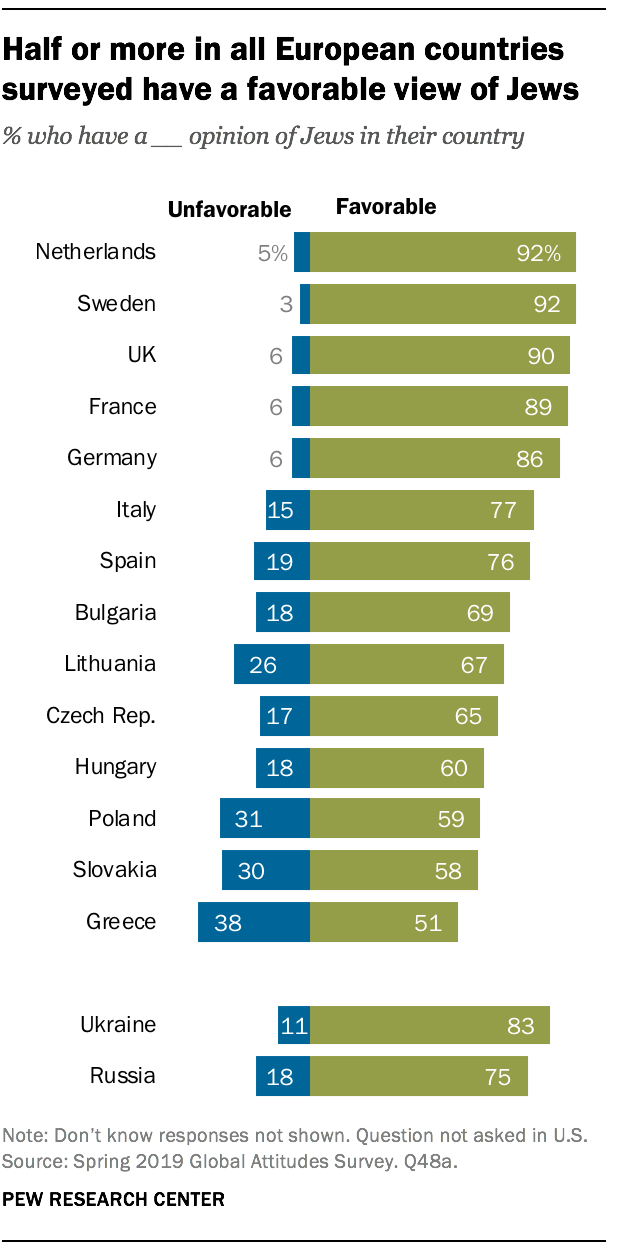 Among the countries surveyed, only in Greece do more than a third have an unfavorable opinion of Jews in their country, where 38% say this.
Among the countries surveyed, only in Greece do more than a third have an unfavorable opinion of Jews in their country, where 38% say this.
In Ukraine and Russia, at least three-quarters of the population has a favorable view of Jews in their country – increases of 15 and 16 percentage points since 2009, respectively.
Other countries that have seen a change in favorable views of Jews in their country since 2009 include Italy (+25 points), Lithuania (+19), Poland (+12) and Germany (+8). And in Germany, the share of the public with favorable views of Jews has risen 33 percentage points, from just over half (53%) in 1991 to 86% in 2019. The rise in positive views of Jews in Germany comes from people living in both pre-1990 West Germany and former East Germany.
There are few demographic differences in attitudes toward Jews. However, in many of these countries, those with more education tend to have more positive attitudes than do those with less education, though majorities at both levels have favorable views. The biggest such difference is in the Czech Republic, where 81% of those with more education have a favorable view of Jews, compared with 60% among those with less education.
Many in Europe view Roma unfavorably
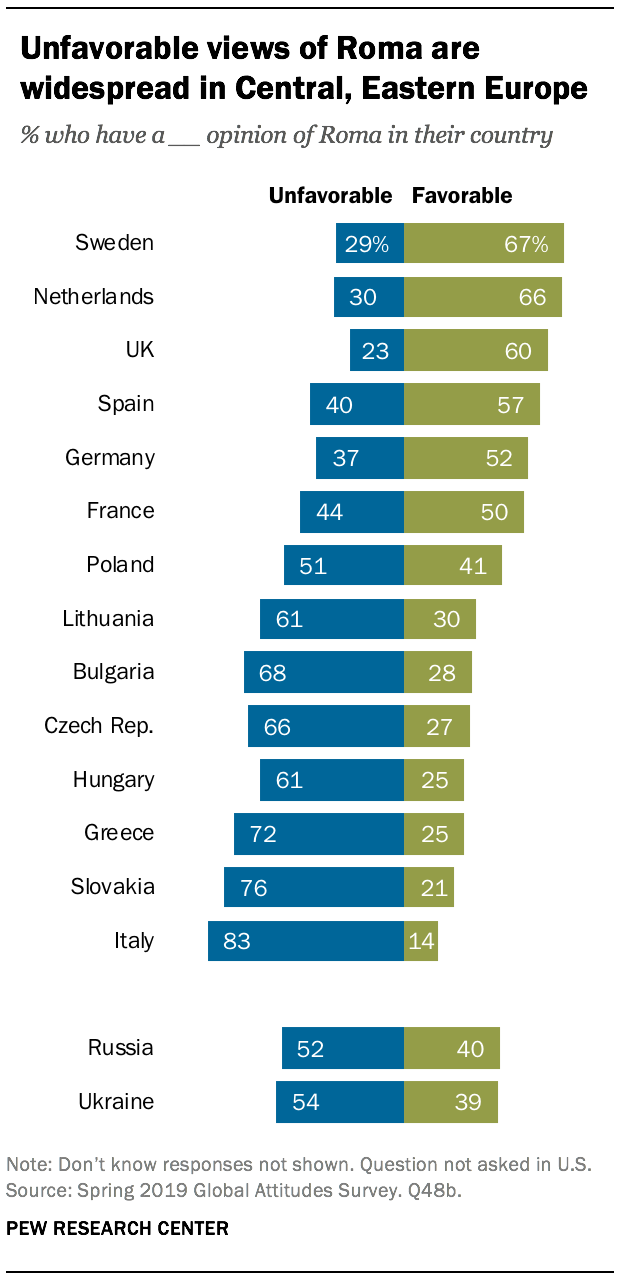 Of the minority groups tested on the survey, Roma stand out for the negative sentiments expressed toward them. In 10 of the 16 countries polled, half or more have an unfavorable view of Roma. The strongest such anti-Roma sentiment is in Italy, where roughly eight-in-ten (83%) say they have unfavorable views of Roma.
Of the minority groups tested on the survey, Roma stand out for the negative sentiments expressed toward them. In 10 of the 16 countries polled, half or more have an unfavorable view of Roma. The strongest such anti-Roma sentiment is in Italy, where roughly eight-in-ten (83%) say they have unfavorable views of Roma.
Positive attitudes toward Roma are more common in northern Europe. Around two-thirds in Sweden and the Netherlands have a favorable view of the group, as do around six-in-ten in the UK and Spain.
In many nations, ratings for Roma have actually improved from when this question was last asked in 2016. For example, in 2016, only a third of French people had a positive view of Roma vs. 50% who do now. Double-digit increases in favorability have also occurred in the UK (+14 points), Sweden (+13), the Netherlands (+13) and Spain (+12).
In general, those with more education and who are left-leaning in ideology tend to have more favorable opinions of Roma than those with less education or who are more right-leaning ideologically.
In addition, those who express favorable views of right-wing populist parties in Sweden, Germany, the Czech Republic, France and Italy are significantly more likely to have a negative view of Roma than those who have unfavorable views of these parties. For example, in Germany, supporters of AfD are 19 percentage points more likely to have a negative opinion of Roma than are those who do not support AfD.
East-West divide in Germany
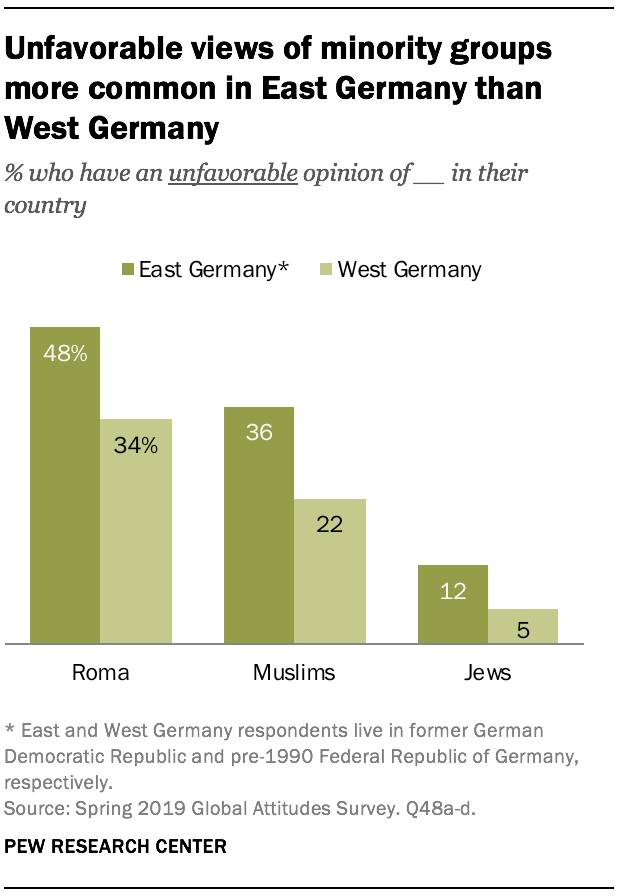 On many of these questions, there are sharp divides between those living in former West Germany and those in the former East. For instance, on views of Roma, those in the East are 14 percentage points more likely to have an unfavorable opinion of the minority group than are those in the West. And on views of Muslims, more than a third in the East (36%) say they have an unfavorable view of Muslims in their country, compared with 22% who say this in the West.
On many of these questions, there are sharp divides between those living in former West Germany and those in the former East. For instance, on views of Roma, those in the East are 14 percentage points more likely to have an unfavorable opinion of the minority group than are those in the West. And on views of Muslims, more than a third in the East (36%) say they have an unfavorable view of Muslims in their country, compared with 22% who say this in the West.
Views of Jews are more closely aligned, with few in either the West or East saying they have an unfavorable opinion of Jews in their country.
Acceptance of homosexuality is common in Western Europe, but more divided elsewhere
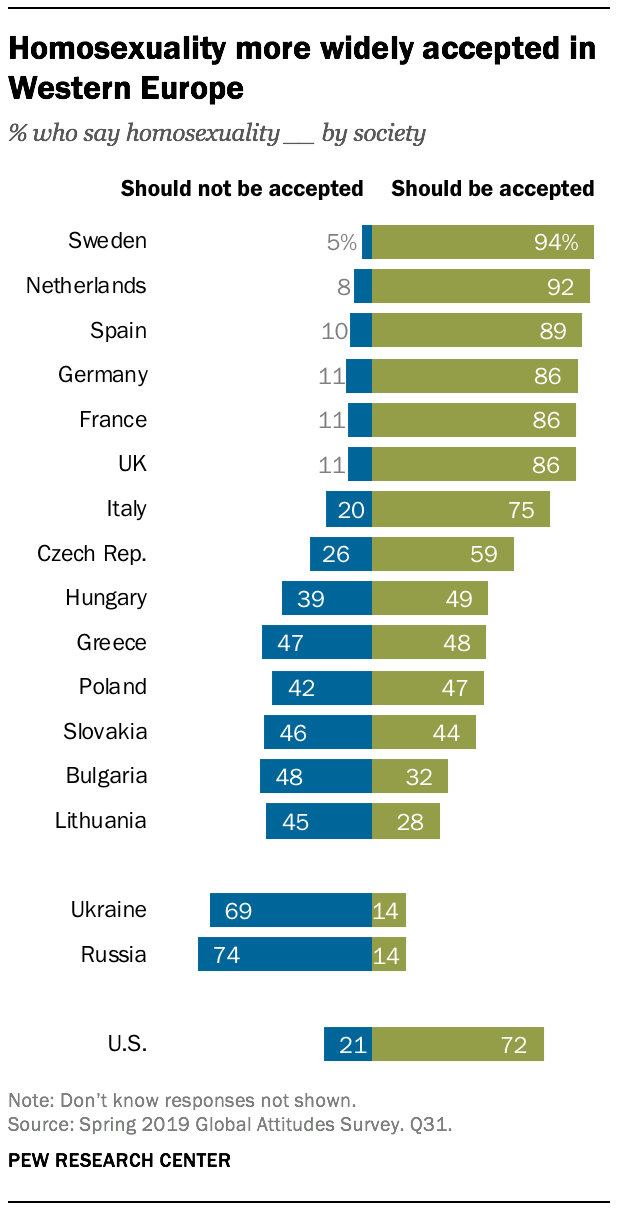 When asked whether homosexuality should be accepted by society or not, there is a sharp divide between Western Europe and the post-Soviet countries. Three-quarters or more in Sweden, the Netherlands, Spain, Germany, France, the UK and Italy say homosexuality should be accepted by society. But roughly three-quarters in Russia and about seven-in-ten in Ukraine say homosexuality should not be accepted by society.
When asked whether homosexuality should be accepted by society or not, there is a sharp divide between Western Europe and the post-Soviet countries. Three-quarters or more in Sweden, the Netherlands, Spain, Germany, France, the UK and Italy say homosexuality should be accepted by society. But roughly three-quarters in Russia and about seven-in-ten in Ukraine say homosexuality should not be accepted by society.
Sentiment is more mixed in many of the Central and Eastern European countries surveyed, with the Czech Republic and Hungary on balance accepting of homosexuality and Bulgaria and Lithuania not accepting.
In the U.S., about seven-in-ten say homosexuality should be accepted by society.
One of the sharpest demographic divides on this question has to do with religiosity. In 14 of the European countries surveyed, those who say religion is very or somewhat important in their lives are less likely to say homosexuality should be accepted by society. This extends to the U.S. as well.
In Greece, for example, 75% of those who say religion is not too or not important at all to them personally say homosexuality should be accepted by society, compared with 41% among those who say religion is very or somewhat important, a 34 percentage point difference.
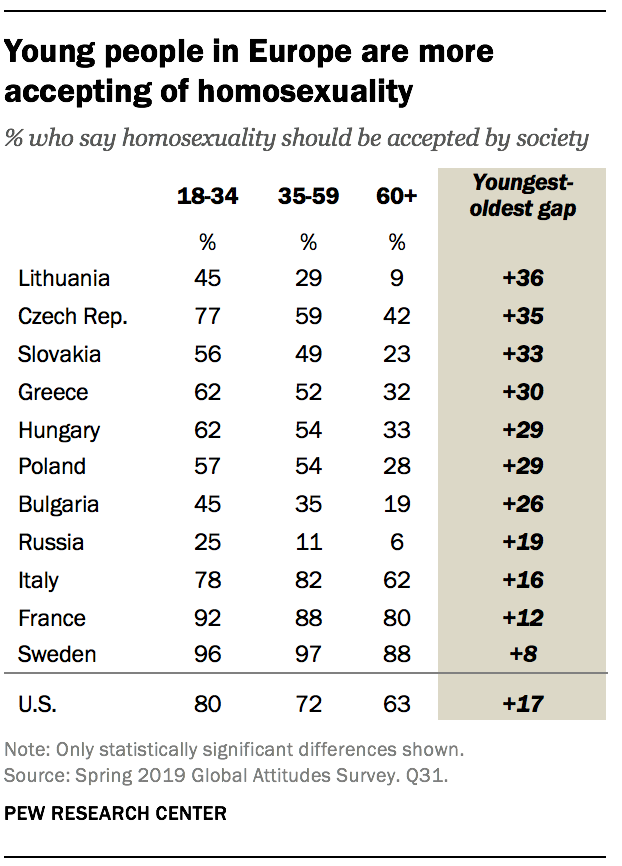 And in 12 of the surveyed countries, including the U.S., those ages 18 to 34 are far more accepting of homosexuality than those 60 and older. These differences are especially acute in Central and Eastern Europe. In Lithuania, for example, 18- to 34-year-olds are 36 percentage points more likely to say that homosexuality should be accepted by society than are those ages 60 and older.
And in 12 of the surveyed countries, including the U.S., those ages 18 to 34 are far more accepting of homosexuality than those 60 and older. These differences are especially acute in Central and Eastern Europe. In Lithuania, for example, 18- to 34-year-olds are 36 percentage points more likely to say that homosexuality should be accepted by society than are those ages 60 and older.
There is also a political divide when it comes to views of homosexuality. In Poland, the Czech Republic, the UK, Sweden, Spain, Germany and France, those who support right-wing populist parties are more likely to say homosexuality should not be societally accepted than are those who do not support such parties.
For example, in Poland, supporters of Law and Justice (PiS) are 21 percentage points more likely to say homosexuality should not be accepted by society than are those who do not support PiS. And in Germany and France, supporters of National Rally and AfD, respectively, are about three times more likely than nonsupporters to say they do not accept homosexuality. But, even among these right-wing populist supporters in Western Europe, majorities still support the acceptance of homosexuality in society.


